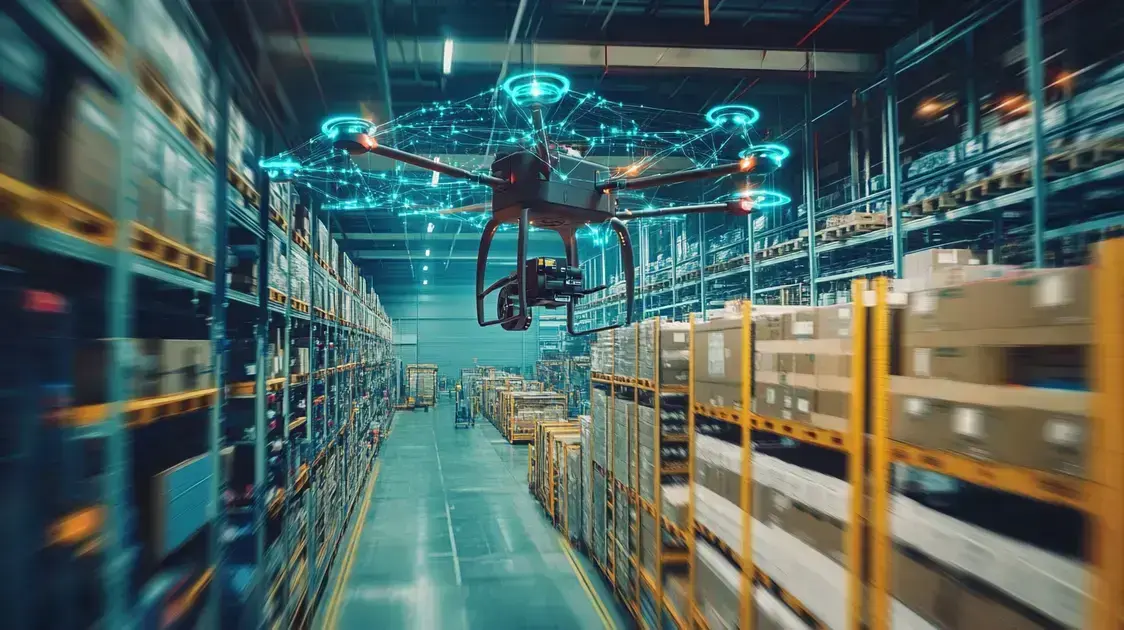In today’s fast-paced world, AI transforming industries has become a pivotal trend, redefining how businesses operate. Artificial intelligence is revolutionizing processes by automating tasks, improving accuracy, and increasing overall efficiency. Companies across different sectors are leveraging AI to optimize operations and stay competitive.
From manufacturing to healthcare, AI transforming industries is driving innovation at an unprecedented scale. Automated production lines, predictive analytics in medicine, and AI-powered customer service solutions are just a few examples of how this technology is enhancing productivity and decision-making. As AI continues to evolve, its applications will only expand further.
Understanding the impact of AI transforming industries is essential for businesses and individuals looking to adapt to this technological shift. Keep reading to explore how AI is shaping the future and discover the key innovations leading this transformation.
Introduction to AI in Industry
Artificial Intelligence (AI) is rapidly changing the landscape of various industries. It refers to the ability of machines to perform tasks that typically require human intelligence, such as learning, reasoning, and problem-solving. The introduction to AI in industry signifies a shift towards smarter operations and more informed decision-making.
How AI is Integrated into Industries
AI systems are being integrated into industries through technologies like machine learning, natural language processing, and robotics. These advancements allow industries to automate repetitive tasks, analyse large data sets, and gain insights that drive efficiency. For instance, manufacturing plants use AI to optimise production lines, forecasting tools in retail aid inventory management, and healthcare facilities employ AI to improve patient diagnostics.
Benefits of AI for Industries
The implementation of AI in various sectors brings a multitude of benefits: enhanced efficiency, improved accuracy, and reduced operational costs. With AI, industries can respond faster to market demands, reduce wastage, and enhance the overall customer experience. This leads to higher profitability and a competitive edge.
Challenges in AI Adoption
Despite its many advantages, there are challenges in adopting AI technologies. Companies must address issues like data security, the need for significant initial investments, and the requirement for skilled personnel to manage AI systems. Additionally, integration of AI into existing workflows can be complex and requires thorough planning.
The Future of AI in Industry
Looking ahead, the future of AI in industries is promising. As technology continues to evolve, we can expect more innovative applications that push the boundaries of what is possible. AI will not only enhance current processes but also open up new avenues for growth and innovation across sectors.
Impact of AI on Manufacturing
The impact of AI on manufacturing has been significant and transformative. As factories across the globe adapt to AI technologies, the efficiencies gained are remarkable. AI has the ability to enhance production processes in various ways, leading to increased output and reduced costs.
Automation and Efficiency
AI enables automation of repetitive tasks on the assembly line. Robots equipped with AI can perform complex tasks with precision, reducing the risk of human error. This automation not only speeds up production but also allows human workers to focus on more strategic roles that require creativity and critical thinking.
Predictive Maintenance
Using AI algorithms, manufacturers can predict equipment failures before they occur. This is known as predictive maintenance. By analysing data from machinery, AI identifies patterns and anomalies that indicate potential issues. This proactive approach minimizes downtime and maintenance costs, keeping production running smoothly.
Quality Control
AI improves quality control processes in manufacturing. Advanced AI systems can analyse products in real-time to ensure they meet quality standards. Machine learning models are trained to identify defects and issues much faster than human inspectors, ensuring only top-quality products reach consumers.
Supply Chain Optimization
AI also plays a crucial role in supply chain management. By forecasting demand and optimizing stock levels, manufacturers can reduce excess inventory and improve delivery times. This fine-tuning of the supply chain enhances overall efficiency and reduces operational costs.
Customization and Innovation
With the help of AI, manufacturers can offer more customised products to meet consumer needs. AI systems analyze consumer data and trends, helping companies innovate and create products that resonate with their target audience. This not only boosts sales but also enhances customer satisfaction.
Challenges of AI Implementation
Despite the benefits, implementing AI in manufacturing comes with challenges. Companies must invest in technology and training. Additionally, there are concerns about job displacement as automation increases. However, many experts believe that while AI may change certain jobs, it also creates new opportunities for skilled workers in technology and management.
AI and Supply Chain Optimization

AI and supply chain optimization have emerged as a powerful combination that enhances the efficiency of logistics and distribution processes. By leveraging AI technologies, businesses can significantly improve their supply chain operations, leading to better overall performance and customer satisfaction.
Data Analysis for Improved Forecasting
AI enables companies to analyse vast amounts of data quickly. By processing historical sales data, market trends, and consumer behaviour, AI tools can predict future demand more accurately. This leads to better inventory management, as companies can stock the right amount of products to meet consumer needs without overstocking or stockouts.
Enhanced Decision-Making
AI tools assist managers in making more informed decisions by providing real-time insights. This includes identifying potential disruptions in the supply chain, such as delays in shipping or availability of materials. With AI, businesses can react swiftly, minimising downtime and maintaining the flow of goods.
Automation of Logistics
Automation is another significant benefit of integrating AI in supply chains. AI systems can optimise routing for delivery trucks, ensuring that products reach customers in the most efficient manner. This reduces transportation costs and speeds up delivery times, enhancing customer satisfaction.
Supplier Relationship Management
AI also aids in managing supplier relationships. By analysing supplier performance data, businesses can identify which suppliers consistently meet quality standards and delivery timelines. This information is crucial for selecting reliable partners and fostering better collaboration.
Risk Management
Another vital aspect of AI in supply chain optimisation is risk management. AI algorithms can predict potential risks, such as economic fluctuations or natural disasters, that may impact supply chains. Companies can develop mitigation strategies in advance, ensuring stability and continuity of operations.
Sustainability Initiatives
AI contributes to sustainability efforts by optimising resource usage. By streamlining operations and reducing waste, companies can lower their carbon footprints. This not only benefits the environment but also aligns with consumer preferences for sustainable practices.
AI in Healthcare Innovations
The role of AI in healthcare innovations is transforming the way medical professionals diagnose and treat patients. By integrating cutting-edge AI technologies, the healthcare industry is enhancing patient outcomes, improving operational efficiency, and reducing costs.
AI in Diagnostics
One of the most significant impacts of AI in healthcare is its ability to assist in diagnostics. AI algorithms can analyse medical images, such as X-rays, MRIs, and CT scans, with incredible accuracy. This enables quicker identification of diseases, like cancer, at earlier stages when treatment can be more effective.
Personalised Treatment Plans
AI also facilitates the creation of personalised treatment plans. By analysing a patient’s genetic information, medical history, and other health data, AI can recommend tailored therapies that improve treatment efficacy. This personalised approach leads to better patient satisfaction and outcomes.
Predictive Analytics for Patient Care
Predictive analytics powered by AI can foresee potential health issues in patients. By examining trends and patterns in health data, AI can alert healthcare providers to patients at risk of conditions like diabetes or heart disease. Early intervention can save lives and reduce hospitalisation rates.
Operational Efficiency
In addition to improving patient care, AI enhances the operational side of healthcare facilities. AI-driven systems can streamline administrative tasks, such as scheduling appointments and managing patient records. This reduces the burden on staff, allowing them to focus more on patient care.
Telemedicine and Virtual Health Assistants
AI powers telemedicine platforms, making healthcare more accessible. AI-driven virtual health assistants can provide patients with medical advice, schedule appointments, and even monitor chronic conditions from home. This convenience leads to increased patient engagement and better adherence to treatment plans.
Drug Discovery and Development
AI accelerates drug discovery processes by analysing chemical compounds and predicting their efficacy. This significantly reduces the time and cost associated with bringing new medications to market. As a result, patients gain quicker access to innovative treatments that address unmet medical needs.
Transforming Retail with AI
AI transforming industries is reshaping how retailers connect with customers and manage operations. By integrating advanced AI technologies, businesses can enhance the shopping experience, streamline processes, and drive sales. As retail evolves, AI continues to play a pivotal role in its transformation.
Enhanced Customer Experience
AI transforming industries is redefining customer interactions through personalized recommendations. By analyzing past purchases and browsing history, AI suggests products tailored to individual preferences, boosting customer satisfaction and increasing sales.
Inventory Management
With AI transforming industries, retailers can optimize inventory management by predicting stock needs based on trends and demand. AI-driven systems reduce waste, ensure popular products remain available, and enhance overall supply chain efficiency.
Smart Pricing Strategies
AI transforming industries enables dynamic pricing models by analyzing market trends in real time. Retailers can adjust prices based on competition, demand fluctuations, and stock levels, ensuring maximum profitability while staying competitive.
AI-Powered Chatbots
Customer service is improving as AI transforming industries introduces chatbots that provide instant support. These AI assistants handle inquiries, guide product searches, and assist in purchases, enhancing customer engagement while reducing staff workload.
Fraud Detection and Prevention
AI transforming industries plays a crucial role in security by detecting fraudulent transactions. AI systems analyze purchasing behaviors to identify suspicious activities, allowing retailers to act swiftly in preventing fraud and securing customer data.
In-Store Experience Enhancement
Retailers are leveraging AI transforming industries to enhance physical store layouts. AI-powered analytics track customer movement, optimize product placement, and improve store design, leading to increased efficiency and higher sales.
By adopting AI solutions, retailers can stay ahead in a rapidly changing market. The power of AI transforming industries is revolutionizing the retail sector, creating smarter, more efficient, and customer-centric shopping experiences.
AI Revolution in Financial Services

The AI revolution in financial services is transforming how banks and financial institutions operate. By integrating AI technologies, these organisations enhance efficiency, improve customer experiences, and reduce risks.
Enhanced Customer Service
AI chatbots are changing the way customers interact with financial services. These virtual assistants can answer queries, assist with transactions, and provide 24/7 support. This immediate response enhances customer satisfaction and frees human agents for more complex issues.
Fraud Detection
AI systems are critical in detecting and preventing fraud. By analysing transaction patterns in real-time, AI can identify unusual behaviours that may indicate fraudulent activity. This proactive approach helps financial institutions protect their customers and mitigate losses.
Credit Scoring and Risk Assessment
AI improves the accuracy of credit scoring and risk assessment. By evaluating a broader range of data, including social media presence and transaction history, AI algorithms can provide better insights into a borrower’s creditworthiness. This leads to more informed lending decisions.
Algorithmic Trading
In investment banking, AI plays a crucial role in algorithmic trading. AI systems can analyse market trends and execute trades at speeds far beyond human capabilities, leading to potentially higher returns and reduced risks.
Personalised Financial Recommendations
AI analyses customer data to offer personalised financial recommendations. This includes investment opportunities tailored to individual risk appetites and financial goals. Such tailored advice helps clients make informed decisions about their finances.
Regulatory Compliance
AI assists financial institutions in adhering to regulatory requirements by automating compliance processes. It can track changes in regulations and ensure that all financial practices align with current laws, reducing the risk of penalties.
AI for Sustainable Development and Future Industry Trends
AI transforming industries is revolutionizing how businesses and organizations address global challenges like climate change, resource management, and sustainable development. By integrating AI technologies into everyday practices, industries can enhance efficiency, reduce waste, and drive impactful innovation.
Optimizing Energy Consumption
AI transforming industries is making energy consumption more efficient through smart grids. AI-powered systems analyze usage patterns, allowing for better distribution and reduced energy waste. This technology ensures sustainability by promoting cleaner and more efficient energy use.
Predictive Analytics for Resource Management
AI transforming industries enables predictive analytics to manage resources effectively. In sectors such as agriculture and water supply, AI forecasts demand, preventing shortages and minimizing waste. This proactive approach leads to smarter, more sustainable resource management.
Smart Agriculture
In farming, AI transforming industries is optimizing crop production while reducing environmental impact. AI-driven systems analyze soil conditions, weather forecasts, and pest activity, providing farmers with precise recommendations. This results in healthier crops with minimal pesticide use, supporting global food sustainability.
Sustainable Urban Development and Conservation
AI transforming industries is reshaping urban planning and conservation efforts. AI optimizes public transportation, reduces congestion, and enhances smart city planning, leading to greener cities. In wildlife conservation, AI monitors endangered species and detects poaching activities, helping protect biodiversity.
AI in Predictive Maintenance and Automation
AI transforming industries is driving predictive maintenance by analyzing machinery data to prevent failures before they happen. Automation is also expanding, with AI streamlining everything from manufacturing to logistics, improving efficiency and reducing operational costs.
Ethical AI and Future Considerations
As AI transforming industries continues to evolve, ethical considerations and regulations will play a vital role. Organizations must address data privacy, security, and transparency to maintain trust while ensuring responsible AI adoption.
By embracing these advancements, businesses can fully leverage AI transforming industries to create a more sustainable and efficient future. AI’s impact is only beginning, and its potential to reshape industries is limitless.
FAQ – Frequently Asked Questions about AI Transforming Industries
How can AI improve customer service in retail?
AI enhances customer service through chatbots that provide 24/7 assistance, handling inquiries and supporting transactions, leading to increased customer satisfaction.
What role does AI play in manufacturing?
AI optimises manufacturing by automating processes, improving quality control, and predicting maintenance needs, thus increasing efficiency and reducing costs.
How does AI contribute to sustainable development?
AI supports sustainable development by optimising resource usage, enhancing energy efficiency, and enabling predictive analytics for better resource management.
What are the benefits of using AI for predictive maintenance?
Predictive maintenance powered by AI reduces downtime by predicting equipment failures before they occur, leading to significant cost savings and enhanced operational efficiency.
How will automation impact the workforce?
Automation may change job functions, allowing employees to focus on more strategic and creative tasks, but it is essential to provide training for staff to adapt to new roles.
What is the importance of ethical considerations in AI?
Ethical considerations in AI are crucial to ensure transparency, protect data privacy, and maintain public trust in AI technologies and implementations.
Check out our article on Fintech Investment to learn how investing in financial technology can offer high returns and reshape the future of finance.
